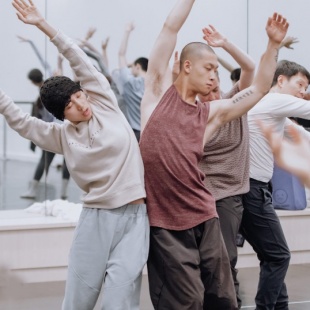East meets modern


With a combination of a variety of art forms including dance, paintings, films, sounds and installations, each performance will bring a different experience to the audience. Attendees are invited to walk among the dancers at a distance close enough to hear their breathing.
West Bund Dome was designed based on I Ching, which brings together 64 existential situations arranged in a system of hexagrams. These 64 hexagrams form a large circle and symbolize all relationships.
"Everything is connected, which is what I want to express through this production," Shen says. "It is very modern, but its core is totally based on traditional Chinese culture."
The choreographer has developed an appetite for showcasing traditional Chinese culture through his creative and avant-garde productions.
Shen is known for his breathtakingly beautiful dance piece Scroll Painting at the opening ceremony of the 2008 Beijing Olympics. Dancers performed on a constantly changing LED scroll of Chinese ink-and-wash paintings, depicting the evolution of China since ancient times.
He also likes to expand his choreography ideas outside of the theater by combining dance with different art forms and presenting them in unconventional spaces.
Undivided Divided, a performance installation Shen created, was staged at the Park Avenue Armory in New York in 2011. In the 55,000-square-foot hall, 2-meter white square panels were laid out in a grid of six rows by six. There were aisles between the panels to allow visitors to walk inside the grid. Eighteen male and female dancers moved slowly as the music alternated. The changing lights and video projections aimed to create shifts in the visitors' visual perception of time and space.
The 52-year-old choreographer says Integrate will "push forward "his 2011 installation.
Integrate will cross more boundaries and reflect deeper understanding of ancient Chinese philosophy and contemporary art, as well as Shen's perception on drastic changes in interpersonal relationships because of the pandemic.
Shen says more elements will be included in Integrate. These include 16 newly painted pieces which he created during his stay at the seaside house in Hainan, and 16 photos and some videos which he shot in both Shanghai and New York. Traditional Chinese medicine will also be added as a scent element into the production.
Born in Hunan in 1968, Shen followed the footsteps of his parents and began training as a local opera performer at the age of 9, and this enabled him to learn singing, dancing, acting and martial arts. He also learned traditional Chinese painting when he was 7.
"From choreography to paintings, traditional Chinese culture is deeply connected to my works," he says.
In 1989, he began modern dance training under the American Dance Festival's program at the Guangdong Dance Academy. He became a founding member of the Guangdong Modern Dance Company in 1991, the first of its kind in China.
After winning first prize in choreography and performance at a national modern dance competition in China in 1994, he moved to New York upon receiving a scholarship from the Nikolais/Louis Dance Theater Lab. Soon, he turned his attention to film, while continuing to pursue innovation in dance theory, choreography and painting throughout the 1990s. He founded his own dance company, Shen Wei Dance Arts, in New York in 2000.
A solo exhibition of Shen's work was held at the Power Station of Art in Shanghai in 2018, offering visitors a comprehensive look at the artist's interconnected approach and work from the 1990s to the present day.
In 2019, Shen was given the 2020 Samuel H. Scripps/American Dance Festival Award for lifetime achievement by the American Dance Festival.
Integrate is the first time that Shen is working with dancers from all over the country after Scroll Painting.
A total of 37 dancers will perform in Integrate. Some of them are friends of Shen, whom he had met when he was one of the judges of television reality show Dance Smash last year. The show featured promising young Chinese dancers as well as veteran dancers like Tan Yuanyuan, principal ballerina with the San Francisco Ballet.
Shen recalls that he got to know some solid techniques through these Chinese dancers.
"Each dancer has his or her unique training and skills. And for me, the most important is not to make them perform the movements, but present the particular quality of each movement," he says.
"I elaborate my ideas and demonstrate movements, hoping to broaden the dancers' vision about dance. It's not easy because they have their own system of training and some of them I've never seen before."





































